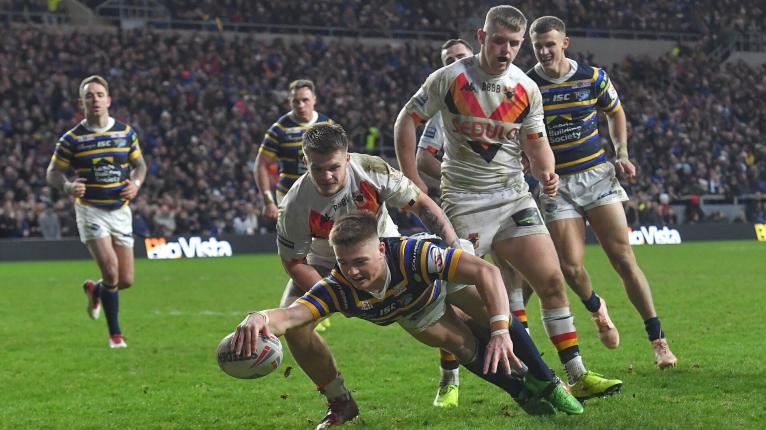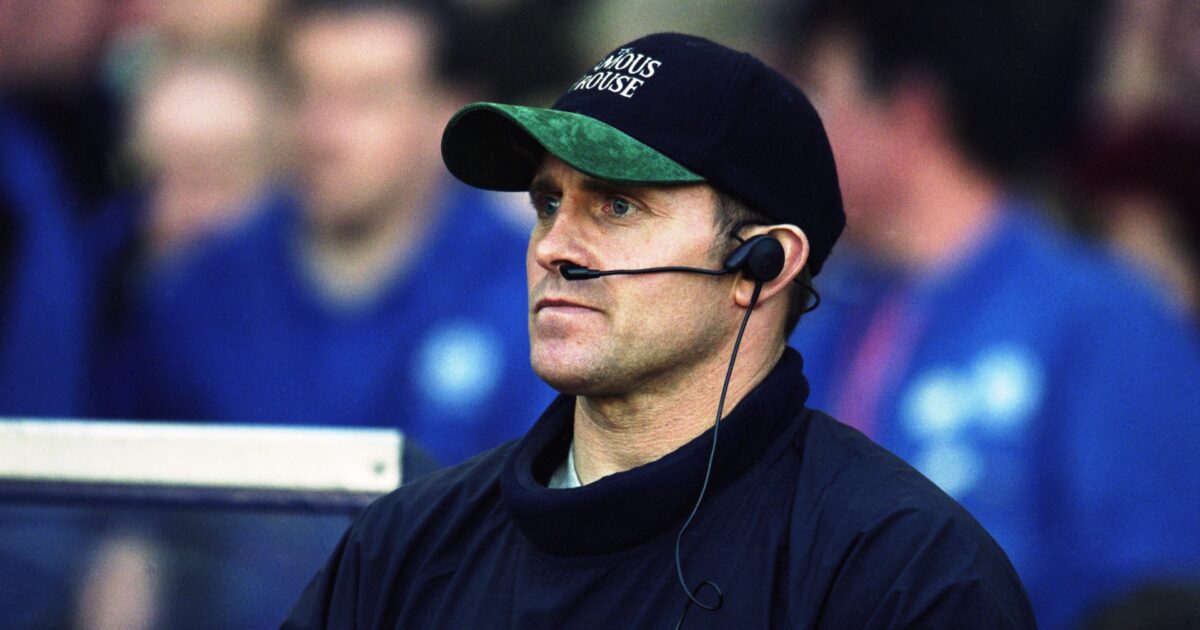'We've got to sharpen ourselves up... we're a bit frightened about upsetting English clubs'

In almost three years as a Scotland talent scout, Alan Tait grew increasingly frustrated by the bureaucracy that clogged his path. The operation was too cluttered and intransigent. Too many people at Murrayfield wanted their say on a player’s credentials.
Tait couldn’t alert the coaches at Edinburgh or Glasgow about a top youngster he had studied – rather, the information was relayed through what he calls “a system within a system”, slowing the process and discouraging sought-after athletes.
At times, he believes his Scottish Rugby Union bosses placed more faith in their structures than his significant expertise across 32 years as a professional player, dual-code international, British and Irish Lion, coach and director of rugby.
The former centre was hired as part of the SRU’s Scottish Qualified programme, which very publicly aimed to identify and recruit eligible talent beyond the national borders. His scouting territory was the north of England, while Ian Smith, another former Scotland international, scoured the south.
Tait spent an eye-watering volume of hours traversing his patch, watching school and academy games, forging fertile relationships with professional clubs who were initially wary of his presence and hostile towards his advances. But with the financial damage wrought by Covid-19 and the absence of any rugby to watch, he and Smith were let go when their contracts expired in the summer.
Having voiced his concerns privately to Scottish Rugby, Tait is speaking out now publicly in the hope of engendering change to a set-up that he argues must be streamlined to fulfil its purpose. “We have got to sharpen ourselves up,” he told RugbyPass. “Every club in England has got a scouting system – I know the Sale scouting system looks at 500 kids every weekend, it’s all covered. Newcastle is the same.
“In England, they are making it as hard as they can for us – they don’t want their players to go to Scotland and that is where we have got to be strong and step in and we’re a bit weak in that area. We’re a bit frightened about upsetting English clubs. But at the end of the day, they can’t all play for England and we are doing a lot of these kids a favour by giving them the experience of international rugby.”
The list of recent Tait captures for Scotland is impressive. He convinced Ewan Ashman, the Sale hooker, to play for the Scottish U20s having also been a part of England’s age-grades. Ashman was the top try-scorer at last year’s World Rugby U20 Championship.
Newcastle back row Tom Marshall was another who excelled in Argentina. Tait advocated strongly for Dan Nutton and Nathan Chamberlain, half-backs who went on to play for Edinburgh, and spotted the Melville twins, Ollie and Cameron, in action for Sedbergh School, propelling them to Scotland U18 honours.
“Gregor Townsend likes Ewan Ashman,” said Tait. “See, there’s a kid that we got to turn round. We knew about him, he was registered with us at an early age with his Scottish father, but England had him in their system and they really wanted him to get through. Just by talking to his father, working with him, he eventually came down the Scottish route and did really, really well for us.
“I got Tom Marshall up to Glasgow and we talked about joining the club. He ended up deciding to stay with Falcons. Newcastle weren’t very happy but at the end of the day, England promised him things, he didn’t make their squad, and he went with Scotland. He and Ashman were probably our best two forwards in Argentina. Hopefully, he will come through with Falcons this year. He enjoyed his time with Scotland and he is there for us now if Scotland need a No8.
“I pushed Fraser Dingwall at Northampton Saints and Cam Redpath, Bryan Redpath’s lad, really hard, but there had been nothing to link these kids into the Scottish system beforehand and England had already got into them. With players coming to the end of their academy contracts and going full pro, we have to be sharper.”
https://www.facebook.com/rugbypass/posts/3874807142592580
The highest-profile recruit, right at the genesis of the SQ programme, was Callum McLelland. Tait watched the then-18-year-old playing rugby league for Castleford and saw in the fly-half a player with all the tools to take rugby union in Scotland by storm.
Scottish Rugby agreed on a fee with Castleford to release McLelland from his contract and place him in Edinburgh’s squad, but Tait was dismayed at how poorly the transition was handled. McLelland never made a senior appearance for Edinburgh but was brilliant for Scotland U20s in their 2018 Junior World Championship campaign. Just nine months after switching codes, though, he returned to rugby league.
“People wanted him to fail – some would rather see him fail than come through because of his background,” Tait said. “He’s from a single-parent home in Castleford and they put him in £700-a-month flat in Edinburgh and had him driving all the way down to Hawick to play because of the draft system.
“It should have been done better. Gregor knew what we had there. The kid was 18, he went out to the U20s World Cup and showed what he could do after four games of senior rugby union with Hawick. He was the gem I found. He could have been an absolute megastar. Hopefully, they have learned from it, but it shouldn’t deter them from signing league players again. I did get the comment, ‘oh we’ll never do that again’ from somebody. We lost a good talent.
“We should have bent a little to try and make it as easy for him as we could, not as hard as we could. Richard Cockerill hardly knew who he was. I should have been reporting to Cockers saying, ‘look, we’ve got this kid, get him in your system, he’s a real good kid’.”

This disconnect between scout and pro-team coach is a problem Tait stresses repeatedly. Checks and balances were necessary, of course, and Scottish Rugby is working behind the scenes to “sharpen up” as Tait would like. A scheme based on people is naturally unwieldy, with each player’s specific needs, age, goals and potentially education is taken into account.
But having picked the brains of his Irish counterparts, Tait felt it needlessly complex to go through multiple members of the Scotland performance arm before a player could be signed. “I couldn’t go direct to Cockers or Dave Rennie because there were so many walls beforehand,” he explained.
“Too many lads wanted their opinions – is this player good enough? Can he pass off his left hand? Can he kick off his right foot? I reported these players back and instead of being able to go to Edinburgh or Glasgow and go to the academies there, it goes through a system within a system and that delays the process.
“Professionalism, you have got to be more streetwise and sharper than that. For the best players available, you have got to be more urgent. Instead of which, we have got him having his say, him having his say, him having his say, and can the player come up for a training session to see if he is good enough. I’m telling you – I’ve watched him six times in matches, I know he’s a good player. They just had to pass so many tests.
“I spoke to Cockers towards the end of my time in the job. He just wants the best that is out there. I want to see Scottish kids do well, but if we have got a Scottish-qualified kid in England and he is really talented, a star in the academy games, then we have to seriously make a move and do things more professionally and sharper.
“We have got to put more trust in the scouts rather than going through all these hoops to get him there. We can’t dilly-dally and that is what we’re doing. We’ve got too many people with too many opinions and we are going to miss out on players.”
For now, Tait is back on the tools in the Scottish borders. A roofer by trade, he is looking for a cottage to renovate and sell on as his next project. Over the years, in many different roles, the union has been good to him, but he worries that fine young players will be lost without dedicated scouts to detect and monitor them, and a clunky procedure to get them from their schools and clubs to the Scottish Rugby system.
He is encouraged by the appointment of Jim Mallinder as director of rugby and the alignment of the national academies with Edinburgh and Glasgow Warriors, allowing the burgeoning crop to run about with the pros. “I don’t want to be paid if I’m not doing any work. It’s pointless paying me if I’m not out watching rugby,” Tait continued. “There are worse things happening than losing your job, but it was a shame because we were three years in, the doors were opening everywhere and we felt we were getting somewhere.
“With Jim Mallinder coming in, he knows the Premiership and he is a great appointment, so hopefully it will improve. You are not pushing every player to the professional teams straight away, but when you find the diamonds, who are really sought-after by clubs, you don’t want many hoops to jump through or you will lose them.”
With its shallow player pool, Scotland can ill afford to squander such opportunities.


































